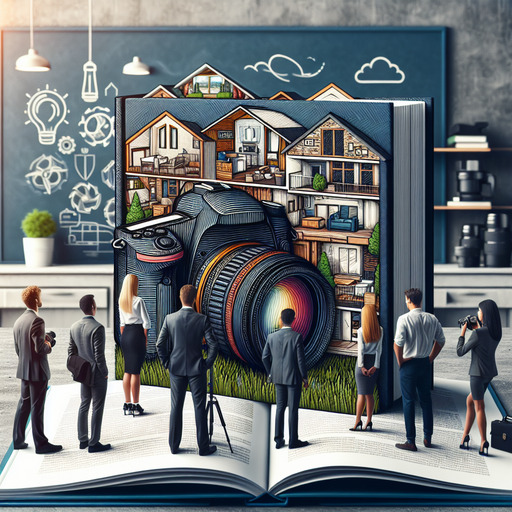
-
Table of Contents
Ready to kickstart your career in real estate photography? Discover expert tips and resources to get started today! Learn More
Introduction
Starting a career in real estate photography involves a blend of technical skill, artistic vision, and business acumen. This niche field requires a keen eye for detail, an understanding of architectural aesthetics, and proficiency with photography equipment and editing software. To begin, aspiring real estate photographers should invest in high-quality camera gear, including a DSLR or mirrorless camera, wide-angle lenses, and a sturdy tripod. Mastering the basics of photography, such as composition, lighting, and exposure, is crucial. Additionally, learning to use photo editing software like Adobe Lightroom and Photoshop will enhance the final images. Building a strong portfolio is essential; consider offering free or discounted shoots for friends, family, or local real estate agents to gain experience and showcase your work. Networking with real estate professionals and marketing your services through a professional website and social media can help attract clients. Continuous learning and staying updated with industry trends will ensure long-term success in this competitive field.
How to Start a Career in Real Estate Photography: Essential Tips and Equipment for Success
Starting a career in real estate photography can be a rewarding venture, combining a passion for photography with the dynamic world of real estate. To embark on this journey, it is essential to understand the foundational steps and the necessary equipment that will set you up for success. First and foremost, gaining a solid understanding of photography basics is crucial. This includes mastering the principles of composition, lighting, and exposure. These skills are the bedrock upon which you will build your real estate photography career. Investing time in learning these fundamentals, either through formal education or self-study, will pay dividends in the quality of your work.
Once you have a firm grasp of photography basics, the next step is to acquire the right equipment. A high-quality DSLR or mirrorless camera is indispensable, as it offers the flexibility and image quality needed for professional real estate photography. Pairing your camera with a wide-angle lens, typically in the range of 16-35mm, will allow you to capture expansive interior spaces effectively. Additionally, a sturdy tripod is essential for achieving sharp, well-composed shots, especially in low-light conditions. As you build your equipment arsenal, consider investing in external flashes or lighting kits to enhance the illumination of interior spaces, ensuring that every room is presented in the best possible light.
With your equipment in hand, developing a keen eye for detail is paramount. Real estate photography is not just about capturing a space; it’s about showcasing it in a way that highlights its best features and appeals to potential buyers. This involves meticulous attention to staging, ensuring that each room is clean, well-organized, and free of clutter. Small touches, such as adjusting furniture placement or adding decorative elements, can make a significant difference in the overall appeal of your photographs. Furthermore, understanding the importance of timing and natural light can elevate your work. Shooting during the golden hours, shortly after sunrise or before sunset, can imbue your images with a warm, inviting glow that artificial lighting often cannot replicate.
In addition to honing your technical skills and artistic eye, building a strong portfolio is essential for attracting clients. Start by offering your services to friends, family, or local real estate agents at a discounted rate or even for free. This will allow you to gain experience and compile a diverse portfolio that showcases your ability to capture different types of properties. As you build your portfolio, consider creating a professional website to display your work and make it easy for potential clients to find and contact you. Social media platforms, particularly Instagram and LinkedIn, can also be valuable tools for networking and marketing your services.
Moreover, understanding the business side of real estate photography is crucial for long-term success. This includes setting competitive pricing, managing client relationships, and staying informed about industry trends and technological advancements. Joining professional organizations, such as the Real Estate Photographers of America & International (REPAI), can provide valuable resources and networking opportunities. Additionally, investing in continuing education, whether through workshops, online courses, or industry conferences, will help you stay ahead of the curve and continually improve your skills.
In conclusion, starting a career in real estate photography requires a blend of technical proficiency, artistic vision, and business acumen. By mastering the basics of photography, investing in the right equipment, developing a keen eye for detail, building a strong portfolio, and understanding the business aspects, you can position yourself for success in this competitive field. With dedication and perseverance, you can turn your passion for photography into a thriving career in real estate photography.
Q&A
1. **What are the steps to start a career in real estate photography?**
– **Learn Photography Basics:** Understand the fundamentals of photography, including composition, lighting, and camera settings.
– **Invest in Equipment:** Purchase a good quality DSLR or mirrorless camera, wide-angle lens, tripod, and photo editing software.
– **Build a Portfolio:** Take high-quality photos of properties, even if they are not for clients, to showcase your skills.
– **Get Educated:** Take courses or workshops specifically focused on real estate photography.
– **Network with Real Estate Agents:** Connect with local real estate agents and offer your services.
– **Create a Website:** Develop a professional website to display your portfolio and provide contact information.
– **Market Your Services:** Use social media, online advertising, and local networking events to promote your business.
– **Offer Competitive Pricing:** Start with competitive rates to attract initial clients and gradually increase as you gain experience.
– **Stay Updated:** Keep up with the latest trends and technologies in real estate photography to continually improve your skills.